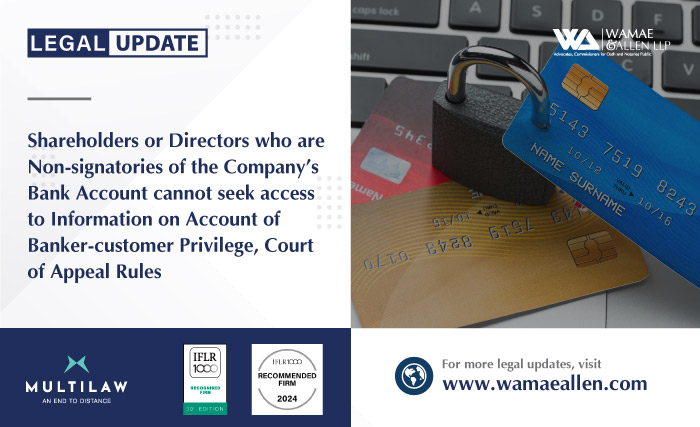INTRODUCTION The Court of Appeal has today 28th February 2025 delivered a Judgment in Nic Bank Limited V Kennedy Odhiambo & 2 Others Civil Appeal No. 278 Of 2018, where the firm acted for the Appellant.
This Judgment settles an important case since it sets out the law in situations where non-signatories of bank accounts seek access to bank accounts through a Court order.
FACTS
NIC Bank Limited (the appellant) was sued by Kennedy Odhiambo and The Lions Heart Self Help Group (1st and 2nd Respondents) along with Amaya Gaming Group (K) Limited (3rd respondent), at the High Court. The 1st Respondent who was the director the 2nd Respondent (the Company) held a 15% share of the company while the other director held a majority 85% shareholding.
The 1st and 2nd Respondents filed an application seeking documents from the appellant and a mandatory injunction for the return of Kshs. 150,000 which was their legal costs in filing the applications seeking the discovery and disclosure of the documents sought.
The High Court exercised its discretion and allowed their discovery application and also awarded the Kshs. 150,000.00 legal costs.
The appellant appealed the High Court’s ruling, raising several grounds including the improper granting of a mandatory injunction, the privileged status of the documents sought and the 1st respondent’s lack of locus standi.
ISSUES
The Court of Appeal framed the following issues:
- Whether the 1st respondent had the legal standing (locus standi) to bring the suit in his personal capacity without filing a derivative suit under Section 239 of the Companies Act.
- Whether the trial court erred in granting a mandatory injunction at the interlocutory stage.
- Whether the trial court violated banker-client confidentiality by ordering the disclosure of confidential documents.
DECISION OF THE COURT
Locus standi
The Court of Appeal found that the 1st respondent did not have the legal standing to seek documents related to the 3rd Respondent’s accounts without filing a derivative suit. The proper procedure was not followed.
Here the Court of Appeal found that though 1st Respondent was a minority shareholder and was not a signatory of the 3rd Respondent’s account, he had not sought leave of the Court to proceed with the derivative suit, contrary to the mandatory provisions of section 239 of the Companies Act. Therefore, the 1st respondent had no locus standi to sue.
Grant of Mandatory Injunction
The Court of Appeal determined that there were no special circumstances to warrant the grant of a mandatory injunction at the interlocutory stage. The award of Kshs. 150,000 was not justified as it was not specifically proven.
Banker-client confidentiality
The Court has since rubberstamped the principle of banker-client confidentiality as a fundamental concept in banking law that protects the privacy of the relationship between a bank and its client. This Principle is succinctly stipulated under Section 40 of the Banking Act, Cap 488 Laws of Kenya.
It is trite that confidentiality between Banks and their customers ensures that any privileged information about a client is not disclosed to third parties without legal sanctions. The Court has however held that it has the authority to order disclosure and/or discovery of documents if the same is for the proper administration of justice.
In determining the prayer for disclosure of privileged customer information, a court has to balance the competing interests of confidentiality and the administration of justice. Court must ensure that only documents which do not fall under legal privilege are disclosed.
CONCLUSION
The decision emphasizes that only signatories of a Customer’s Bank Account can sue requesting for disclosure of Bank records.
While appreciating the decision by the court of Appeal, it is important to highlight that the principle of banker-client confidentiality is key in fostering trust between financial institutions and their clients. This confidentiality is however not absolute as courts may compel banks to disclose documents when the circumstances permit and in the interest of fair and just administration of justice.
This article is provided free of charge for information purposes only; it does not constitute legal advice and should be relied on as such. No responsibility for the accuracy and/or correctness of the information and commentary as set in the article should be held without seeking specific legal advice on the subject matter. If you have any query regarding the same, please do not hesitate to contact Litigation Department at Litigation@wamaeallen.com
 Loading...
Loading...
About the author
Caxstone specializes in civil, employment and labour disputes, constitutional law, family law and succession, and environment and land matters. He has amassed a wealth of knowledge and experience in litigation which is evident in the successes obtained for clients. He is an active member of the Employment and Labour Relations Court Bar-Bench committee.
Frankline M. Otieno is a dispute resolution associate, recommended professional and committed to offering sustainable client-centred solutions to legal issues.
Frankline is astute in commercial litigation, securities law, banking law, intellectual property litigation, public procurement, land law litigation, Judicial Review and Administrative law litigation, sports law, tax litigation, administrative law, consumer protection law, competition law and constitutional litigation.
Denis Mutugi specializes in Commercial Litigation and Alternative Dispute Resolution.
Denis graduated with a Bachelor of Laws, LLB (Hons) from The University of Nairobi in 2021 and was admitted to the Roll of Advocates of the High Court of Kenya in the year 2023.
Denis has amassed a considerable wealth of experience in conducting legal research on various complex legal matters touching on Commercial, Insurance, Employment and Insolvency law and bankruptcy.
-
Denis Mutugihttps://wamaeallen.com/author/denis-mutugi/
-
Denis Mutugihttps://wamaeallen.com/author/denis-mutugi/













